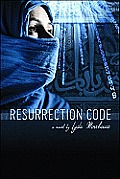
| Series: | AngeLINK #5 |
| Publisher: | Mad Norwegian |
| Copyright: | March 2011 |
| ISBN: | 1-935234-09-9 |
| Format: | Trade paperback |
| Pages: | 191 |
This is the fifth book in the AngeLINK series, continued with a different publisher. While much of the story is a flashback that takes place before the four previous books, the frame story is set well after Apocalypse Array and contains significant spoilers for the four previous books. You don't want to read this out of order (plus, it's much more interesting if you already know Mouse and are already curious about his past).
At the start of Archangel Protocol, Mouse was already one of the premier hackers in the world and had already created his personal AI Page. Scattered through the series have been references to his past on the streets of Cairo after the destruction of the Aswan Dam, during the wars that unleashed the Medusa bomb and caused the religious backlash against science. Here we get parts of that story in considerably more detail. Given that Mouse is my favorite of Morehouse's characters, I was immediately sold.
Half the story is told in the first person from Mouse's perspective, split between his past and a present that's some years after the end of Apocalypse Array. The other half is told from Morningstar's perspective, similarly split between the past and the present. Morehouse uses this to further develop the complex relationship between Morningstar and angels, and with God, in ways that hint even more clearly than the previous series at Morningstar's complex role as both outcast and servant simultaneously. There seems to be a trend in angel fiction towards re-evaluating and reworking the Miltonian picture of pride-driven Satan into a more difficult and tricky mix of rebellion, free will, and unclear divine intentions that may actually need him. If you, like I, enjoy that sort of examination, Morehouse offers more food for thought here.
That is, to some extent, background, however. The main theme of Resurrection Code is sexual and gender presentation. Both the flashback and Mouse's present-day actions are focused on someone he knew during the hard days after the collapse of Egypt: a transgendered boy (later man) whose life became far more difficult when the religious fervor that swept the world brought with it even harsher intolerance for any mixing or crossing of gender identity lines.
This too is not new territory for Morehouse in this series. Mouse's AI Page plays with gender fluidity, Ariel cross-dresses throughout the series, and several other main characters do not fall neatly into traditional gender roles. But Resurrection Code is considerably more direct. Mouse concerns himself primarily with the practical, showing his typical tendency to take people at face value as they present themselves. Morningstar directly confronts the theological, asking pointed questions about, among other things, God's habit of returning all angels to earth in male bodies and Ariel's determined compensation for this. This is a story of the street survival of a couple of admirable and enjoyable characters, but it's also a book about arguing with God in various different ways. Like the rest of the series, it doesn't reach firm conclusions, but it hints towards a deeper understanding of the nature of messiahs in Morehouse's world.
I like books that take a story, concept, or pattern that we think we know well and complicate it. Morehouse has done that with Christian eschatology, and more subtlely with Christian salvation, service to God, and religious practice, throughout this series. In previous books, that was marred by uneven pacing and occasionally unclear story arcs. Both pacing and story are firmer, smoother, and therefore more engrossing here. Resurrection Code felt focused, tight, and polished in places where the previous books sprawled. I think it represents noticeable improvement in Morehouse's skill as an author.
This probably isn't the book with which to start the series, so the target audience for Resurrection Code is mostly people who have already been reading Morehouse's angelic cyberpunk world. To that audience, I strongly recommend it. If you liked the rest of the series, you'll like this as well; it's a good coda to the story and offers another angle of explanation on the ending of Apocalypse Array. If you haven't read this series before, give it a try, but start with Archangel Protocol.
Reviewed: 2011-05-21